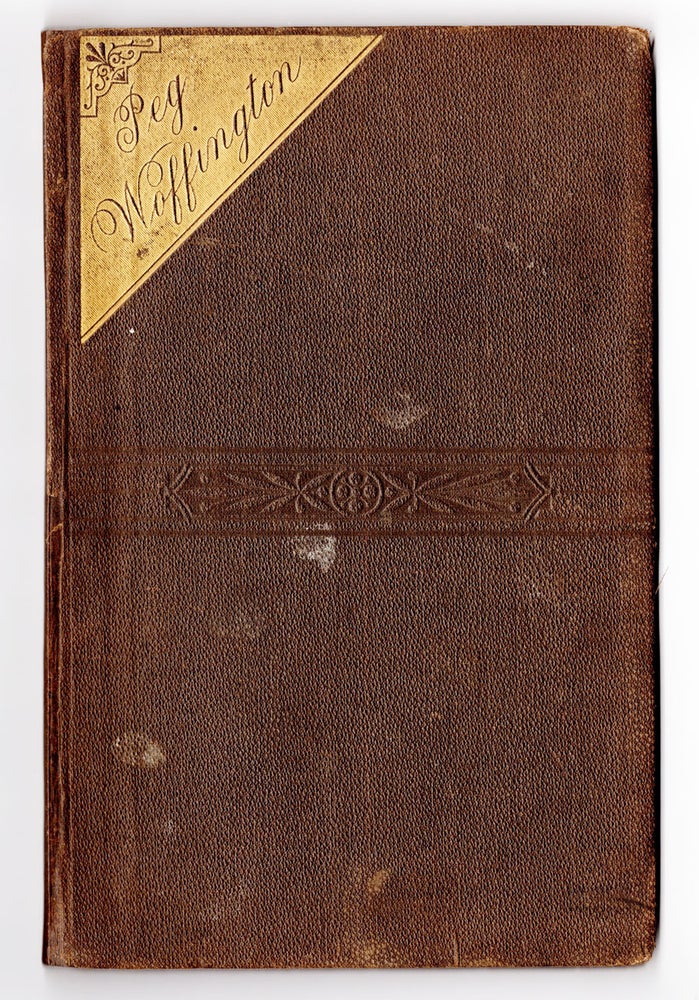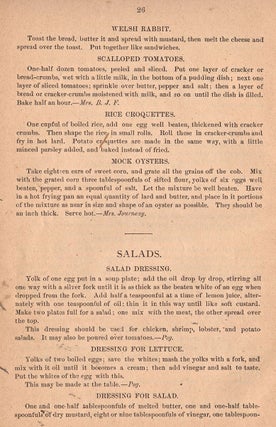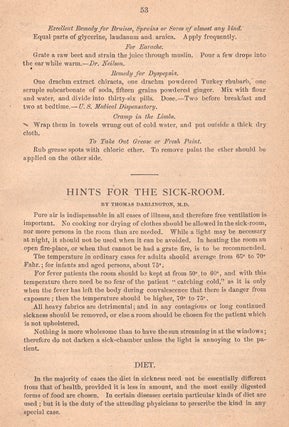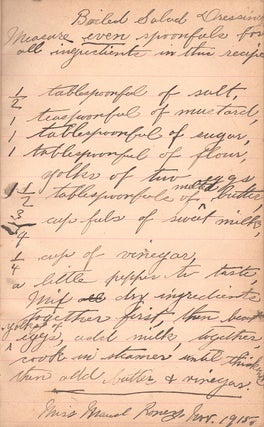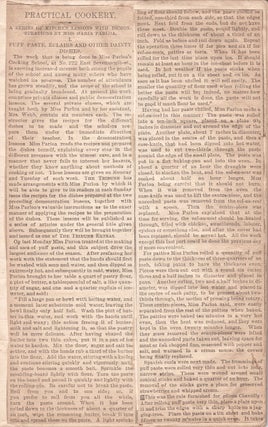Peg Woffington. Choice Receipts by Experienced Housewives.
New York: Baker & Godwin, Printers, No. 25 Park Row, 1881. 8vo, original pebbled flexible brown cloth, with recently renewed spine, decorative gilt title on upper cover, blind-stamped. [5], 74 pp., [2] pp. ads, 2 ads inside covers, [4] pp. of manuscript recipes, 2 pp. of affixed newspaper articles, [42] lined blank pp. throughout text in groups of 4. An exceptionally rare, pseudonymously written cookbook, taking for both its author and title the name of preeminent eighteenth-century Irish actress Peg Woffington, known for her wit, beauty, independence, and many theatrical accomplishments. Published in the midst of the nascent women’s movement of the nineteenth century, this volume opens with a lively “Epistle from Peg,” subtly evoking the spirit of women’s rights, followed by recipes intended to simplify a woman’s life and improve the diet and health of the nation. A representative recipe, for Welsh Rabbit, reads as follows: “Toast the bread, butter it with mustard, then melt the cheese and spread over the toast. Put together like sandwiches.” Other recipes include: Grandma’s Fish-Balls, Turtle Bean Soup, Blind Hare, Snipe and Woodcock Fried, Parsnip Fritters, Rusk, Brown Betty Pudding, Delmonico Cream, Crullers, Grape Catsup, and Bouillon. Also included are manuscript recipes, drawn from unidentified sources, for Coffee, Layer Fruit Cake, Snow Pudding, and Boiled Salad Dressing. A newspaper recipe by Miss Maria Parloa is pasted in, entitled “Practical Cookery: Puff Paste, Eclairs and other Dainty Dishes.” Also included here are medical recipes for the treatment of such afflictions as gout (yarrow), hiccoughs (hold nose and drink water), earaches (beets) and more. Air, sun, and specific temperatures are recommended for sick rooms. Additionally, some twenty pages of ads promote ocean travel companies such as the Inman Line and Anchor Line Mail Steamers, teas and coffees, Hydroleine, sewing machines, Pond’s Extract, pianos, artists’ materials and items of domestic interest. Margaret “Peg” Woffington (ca. 1720–1760), daughter of a short-lived Dublin bricklayer and vegetable-peddler (and/or laundress) mother, was initially discovered by Signora Violente in the Dublin streets selling greens. Violente, an Italian acrobat and rope dancer, employed Peg and sister Mary in her “Lilliputian” (children’s) company at Smock Valley, then toured London with a production of Gay’s The Beggar’s Opera, in which Woffington played her first male role as MacHeath. Demonstrating a notable comic range for such ”breeches” roles, Woffington received acclaim in 1741 playing Sir Harry Wildair in The Constant Couple in Dublin and London, and rose to the Shakespearean roles of Ophelia and Rosalind, becoming a reigning favorite of London’s Drury Lane and Covent Garden. Woffington was also notorious for her four high-profile love affair and cohabitation with acting partner David Garrick. Admired for her wit, beauty, and conversation, Woffington became the first female member of the Beefsteak Club, also known as the Sublime Society of Steaks or “the Club”, and, somewhat astonishingly, was elected president of the club soon after in 1750. Here, she was said to “rule the court, the camp and the grove” (Sir Walter Scott). Some of its members included actor David Garrick and artist William Hogarth, as well as many other London celebrities. After a seizure playing Rosalind in 1757, dramatically uttering the last lines as she fell, Woffington retired to Teddington, where she engaged in benevolent work, planning to build and endow almshouses until her death at age 39. In 1852, Charles Reade and Tom Taylor wrote the play Masks and Faces which featured Woffington as a central character. Following the play's success, Reade wrote the novel Peg Woffington, published in 1853. She also appeared as a character in silent films of the twenties. These works kept Woffington in the public eye long after her death, her name becoming synonymous with female charm and independence. According to the Encyclopedia Britannica, Woffington “could never long adapt herself to his [lover David Garrick] or any other man’s ideal.” Writing under Woffington’s name in the Epistle, the author states “I declare a woman’s right and curiosity to be interested in national calamities, and to make effort for their cure. You will agree with me when I say that bad cooking and disagreeable dinners lie at the root of all evil…Woman, who though she know it not, is ever the caterer to man’s appetite, and the kitchen's slave, for when she is not cooking she is thinking of what she should cook next. To you I offer not only freedom, but sovereignty, over both food and the feeder.” This 1881 cookbook precedes a similarly-titled cookbook published in 1908 by Pearl Press in Brooklyn, N.Y., Peg Woffington; Choice Recipes by Experienced Housewives of St. John's Guild, Pleasantville, New York. No copies recorded in OCLC. REFERENCES: Traynor, Jessica. Peg Woffington, the best Irish actress of the 18th century at irishtimes.com; Woffington, Peg at encyclopedia.com; Peg Woffington at britannica.com; Peg Woffington at peoplepill.com; Margaret “Peg” Woffington at historyswomen.com CONDITION: Good, offsetting from newspaper clippings to one page of text and one unused ruled page, toning as expected.
Item #6081
Sold


